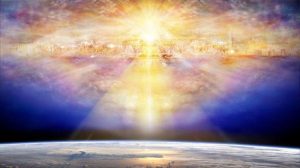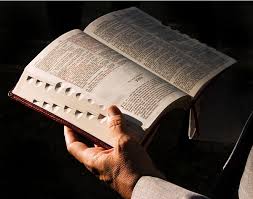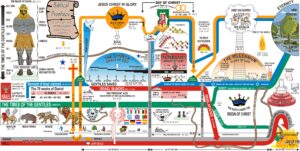A few weeks ago I was talking to some of my younger Christian friends regarding the various things which had happened and were yet to happen. They had little problem with the history – creation, the fall, the flood, the Exodus, Moses receiving the law, David, the captivity, the birth of Christ, His death and resurrection, Pentecost etc., but they had real problems with what is to come. I thought therefore in this and a few coming letters to look at these future events so that we might be sure where we are in relation to them.
The Rapture
 The next event for us is the rapture. It could be at any time – today even – and applies only to the church. Because of that, there is no reference to it in the Old Testament. In scripture, the in Greek word ἁρπαγησόμεθα/harpagēsometha/Strong 726 in 1Thess 4:17. Is translated ‘caught up’. The word ‘rapture’ is a noun with the same meaning.
The next event for us is the rapture. It could be at any time – today even – and applies only to the church. Because of that, there is no reference to it in the Old Testament. In scripture, the in Greek word ἁρπαγησόμεθα/harpagēsometha/Strong 726 in 1Thess 4:17. Is translated ‘caught up’. The word ‘rapture’ is a noun with the same meaning.
We should ask why is the rapture so little understood, or even accepted amongst many sincere Christians? This scripture in 1 Thess 14:13-18 is very clear: ‘But I would not have you to be ignorant, brethren, concerning them which are asleep, that ye sorrow not, even as others which have no hope. For if we believe that Jesus died and rose again, even so them also which sleep in Jesus will God bring with him. For this we say unto you by the word of the Lord, that we which are alive and remain unto the coming of the Lord shall not prevent them [Darby – are in no way to anticipate those] which are asleep. For the Lord himself shall descend from heaven with a shout, with the voice of the archangel, and with the trump of God: and the dead in Christ shall rise first: then we which are alive and remain shall be caught up together with them in the clouds, to meet the Lord in the air: and so shall we ever be with the Lord. Wherefore comfort one another with these words’. Look at a few phrases ‘the dead in Christ shall rise first’ – that encompasses all those who have been ransomed by His blood from creation onwards. Whether we who are alive now will be taken before the rapture, none of us knows. Paul referred to ‘we, the living’, as if he thought it would be within his lifetime. Of course we know it was not, but he was looking forward to the Lord’s coming – we should be too.[1]
Paul also says, ‘we shall ever be with the Lord’ (v.17), and ‘them also which sleep in Jesus will God bring with him’. Now when Jesus comes (the public second coming, often referred to in scripture as ‘the appearing’) the dead in Christ will be with Him – and so will be those lovers of the Lord who were alive at the rapture. Also, ‘When Christ who is our life shall appear, then shall ye also appear with him in glory’ (Col 3:4). Clearly, we could not come with Him, if we were still on the earth.
The church is heavenly entity: she belongs to Christ in heaven, and her hope and glory is Christ Himself. She looks forward to and His return to take up His rights. Therefore the church has nothing to do with the course of events of the earth. This makes its rapture and return with Christ so simple and clear, as we see from Col 3:4, ‘When Christ who is our life shall appear, then shall ye also appear with him in glory.’ [2]
1 Cor 15:51-52 is another scripture which describes the rapture: ‘We shall not all sleep, but we shall all be changed, in a moment, in the twinkling of an eye, at the last trump: for the trumpet shall sound, and the dead shall be raised incorruptible, and we shall be changed. ’ From this we can deduce that there will be a rallying trumpet, the whole event will be very quick, and our bodies will be changed. The latter is also referred to in Rom 8:23 ‘waiting for the adoption, [to wit], the redemption of our body’.
When the Lord was discoursing with his disciples immediately prior to the crucifixion, He tells them that a place was being prepared for the saints to be with Him, where He is. ‘I go to prepare a place for you. And if I go and prepare a place for you, I will come again, and receive you unto myself; that where I am, there ye may be also.’ (John 14:2-3).
Therefore:
- The rapture will be sudden
- No one knows when the rapture will be
- The rapture will be private
- At the rapture there will be a voice (or trumpet sound) which only Christians will hear
- At the rapture the Lord will not come quite to the earth – just to the air
- The rapture will affect people, whether raptured or left here: the world carries on
- At the rapture bodies will be changed
The question often arises as to what the effect of the saints being taken will be. Suddenly millions of people will just vanish! Hal Lindsey, who awakened many Christians to the rapture in the 1970’s in a popular book ‘The Late Great Planet Earth’, said that there would be confusion. I doubt it. Christians who are ‘not of the world’ will not be missed. Writing about future events in his second epistle to the Thessalonians Paul said, ‘God shall send them strong delusion, that they should believe a lie’ (2 Thess 2:11). The Antichrist will conjure up a satisfactory credible explanation which will be accepted universally.
The Rapture and the Appearing
We must not confuse the second coming with the rapture. At the rapture the Lord comes to the atmosphere immediately above the earth. At the appearing He comes to the earth. Here are some differences between the rapture and the appearing:
| RAPTURE | APPEARING |
| No one knows when it will be | It will be 7 years after the rapture |
| It will be private | It will be very public |
| The Lord comes to the air | The Lord comes to the earth |
| He comes FOR His saints | He comes WITH His saints |
| It is followed by the great tribulation[3] | It is followed by the millennium |
| He is the Bridegroom | He is the King |
| He is the Morning Star | He is the Sun of Righteousness |
| It is for the Church | It is not for the Church |
| There is little in prophecy | There is much in prophecy |
| The world will carry on | Christ will reign |
| The man of sin will be revealed | Satan will be bound |
| There will be the judgment seat of Christ[3] | The world will be judged |
| People will be translated | Nobody will be translated |
| People will believe a lie | The truth will be acknowledged |
Two Resurrections
Something else many Christians do not realise is the fact there will be two resurrections. The Old Testament did not distinguish between the two. John made the distinction very clear. When the Lord was here, He said ‘all that are in the graves shall hear his voice, and shall come forth; they that have done good, unto the resurrection of life; and they that have done evil, unto the resurrection of damnation’ (John 5:28-29). Also in Revelation, ‘Blessed and holy is he that hath part in the first resurrection: on such the second death hath no power’ (Rev 20:6). The second death is to the Great White Throne – the resurrection of the dead for judgment[3].
The first resurrection (the resurrection of the just) is primarily at the rapture. J N Darby says that it will be the consummation of our happiness[4]. Having given life to our souls, He will give life to our glorified bodies.
Satan is the author of this confusion. He does not want Christians to burn with anticipation of the Lord’s immediate coming. He certainly does not want us saying ‘Come Lord Jesus’ (Rev 22:20).
Dear Christian friends, may we keep near Him, and be assured as to the immediacy of His return.
Sosthenes
December 2016
[1] See ‘ADOSS – The Lord is Coming Very Soon’
[2] Note that this is distinct from the individuals who, though not of this world have to do with things here.
[3] This will be addressed in a later note, God willing.
[4] Lecture 4 on ‘The Hopes of the Church of God’, summarised by ADOSS as ‘The First Resurrection – or The Resurrection of the Just’
See other references in ADOSS:
- After the Rapture, the Jewish Remnant – Particularly from the New Testament
- After the Rapture, the Jewish Remnant – Particularly from the Psalms
- After the Rapture, the Jewish Remnant – Particularly from Isaiah
- John Nelson Darby’s Prophetic Map
- The Importance of Prophecy
- The Remnant of Israel
- The First Resurrection – or The Resurrection of the Just.
- The Second Coming of Christ






